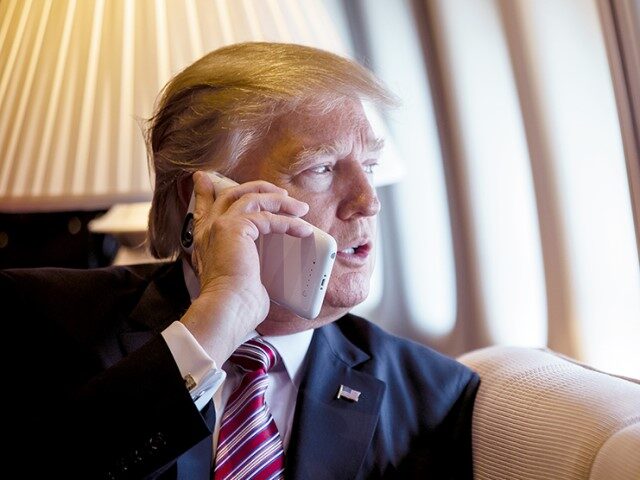Ukrainian Foreign Minister Dmytro Kuleba told top Chinese Communist Party diplomats in Beijing on Wednesday that his country is “willing and ready for dialogue and negotiations with Russia,” a stark change from repeated refusals by the administration of President Volodymyr Zelensky to consider direct talks.
Russia has been engaging in colonialist adventurism in Ukraine for a decade, first “annexing” Ukraine’s Crimean Peninsula in 2014 under President Barack Obama and backing pro-Russian “separatist” groups in the Donbas region. In February 2022, Russian strongman Vladimir Putin announced the launch of a “special operation” to oust Zelensky, consisting of a full-scale military invasion of the country that persists today. Zelensky has for two years refused talks with Putin on the grounds that no talks should take place until Russian soldiers are no longer present in his country.
His last direct contact with Putin occurred in December 2019 – talks chaperoned by French President Emmanuel Macron and then-German Chancellor Angela Merkel that a frustrated Zelensky dismissed as useless, demanding “serious” countries help mediate instead of France and Germany.
Kuleba was in Beijing for talks with Chinese Foreign Minister Wang Yi and other senior Communist Party leaders on both the ongoing invasion and trade ties between Kyiv and Beijing. China is Ukraine’s largest trade partner despite being arguably Russia’s closest geopolitical ally.
“Today in China, I held detailed and thorough negotiations with my Chinese counterpart Wang Yi about the path to peace,” Kuleba wrote in a statement on social media posted after his talks with Wang. “I emphasized that Ukraine needs a just and lasting peace, not just an illusion of peace, and I appreciate that this position was reciprocated.”
Kuleba said he and Wang “agreed that all forces must work together to find common ground on the path to restoring true peace in accordance with the principles of the UN Charter.”
The Chinese Foreign Ministry offered reporters more detail following the meeting, noting that Kuleba offered support for China’s false colonialist claim to the nation of Taiwan and celebrated the commercial ties between his country and the Communist Party.
“Foreign Minister Wang Yi noted that China and Ukraine are friends to each other,” Chinese Foreign Ministry spokeswoman Mao Ning told reporters. “Ukraine is one of the first countries to support and participate in Belt and Road cooperation. In recent years, China has remained Ukraine’s largest trading partner and the largest exporter of agricultural products.”
The Belt and Road Initiative (BRI) is a global Chinese government program in which Beijing offers predatory loans to poor nations that the country is then expected to use to pay Chinese contractors to build overpriced infrastructure projects. When the countries fail to keep up with their loans, China seizes the projects, as has occurred in Sri Lanka.
Mao emphasized that Kuleba, in his meeting with Wang, denied Taiwanese sovereignty and described China’s role in the invasion as “active and constructive.”
“Ukraine is willing and ready to have dialogue and negotiation with Russia,” Mao claimed that Kuleba said. “And of course, negotiations should be rational, substantive and aimed at achieving just and lasting peace.”
The Ukrainian state outlet Ukrinform reproduced Kuleba’s “willing and ready” remark, apparently confirming its accuracy.
The Chinese state media newspaper Global Times, citing pro-regime “experts,” interpreted Ukraine’s change in disposition as a victory for China, but also an indication that American President Joe Biden’s exit from the 2024 presidential race may have forced Kyiv to recalibrate its approach to the war.
“Following US President Joe Biden’s withdrawal from the presidential race, it’s widely believed that Washington’s stance on the Ukraine crisis may change,” the Global Times claimed. The propaganda outlet cited a regime-friendly “scholar” who suggested, “the fact that Donald Trump stating that he will immediately resolve the Russia-Ukraine conflict if he takes office worries Kiev.” As a result, Ukraine has to consider peace talks.
Zelensky himself has denied concerns about the potential return of former President Donald Trump to the White House.
“If Mr. Donald Trump becomes president, we will work,” he told Bloomberg News this month. “I am not afraid of that.”
Trump and Zelensky spoke for the first time in years this weekend, shortly before Biden dropped out of the race. Zelensky expressed gratitude towards Trump for the conversation and hinted at a future in-person meeting.
“Ukraine will always be grateful to the United States for its help in strengthening our ability to resist Russian terror. Russian attacks on our cities and villages continue every day,” Zelensky said in a statement on social media. “We agreed with President Trump to discuss at a personal meeting what steps can make peace fair and truly lasting.”
Biden’s policies towards the Ukraine war have been highly favorable to Zelensky, offering expansive financial and military aid with seemingly no end in sight. Trump has questioned the policy – at one point joking that Zelensky is “maybe the greatest salesman of any politician that’s ever lived” because “every time he comes to our country, he walks away with $60 billion.” Trump maintained a far more rigorous sanctions regime on Russia, however, including pivotal sanctions on the now-defunct Nord Stream 2 pipeline project. Biden lifted those sanctions about half a year before the full-scale invasion, outraging an “unpleasantly surprised” Zelensky.

COMMENTS
Please let us know if you're having issues with commenting.